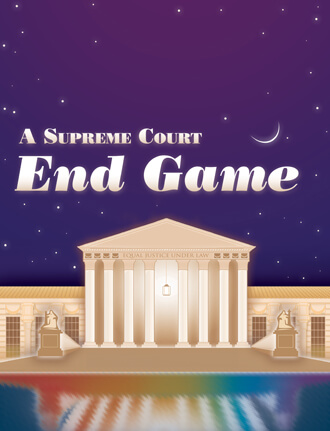Oklahoma marriage plaintiffs Mary Bishop and Sharon Baldwin. | FREEDOM TO MARRY
The same appellate panel of three judges that last month ruled that Utah’s same-sex marriage ban is unconstitutional reiterated that ruling on July 18 in Oklahoma’s appeal of a district court ruling striking down the ban there. The 10th Circuit Court of Appeals panel found the Oklahoma prohibition was unconstitutional for the same reason: it denies same-sex couples a fundamental right without sufficient justification.
Once again, Judge Carlos F. Lucero wrote for the majority, devoting most of his opinion to procedural and jurisdictional issues. Judge Jerome A. Holmes, authored a separate concurring opinion addressing an issue that technically wasn’t before the court: whether the state’s voter-approved marriage amendment resulted from unconstitutional animus, which he concluded it did not.
As in the Utah case, Judge Paul J. Kelly, Jr., dissented, but the focus of his dissent was not on the merits but rather whether the plaintiff couples who brought the suit had legal standing to do so.
Ruling stayed pending likely appeal directly to the Supreme Court
And, as it did with the Utah case, the 10th Circuit panel stayed its ruling pending the state’s further appeal — in all likelihood directly to the Supreme Court.
The Oklahoma marriage case was filed nearly 10 years ago by two same-sex couples, Mary Bishop and Sharon Baldwin, who were seeking the right to marry, and Susan Barton and Gay Phillips, who were civilly united in Vermont in 2001 and subsequently married in Canada in 2005 and California in 2008. The original suit named the governor and the attorney general as defendants, and in an earlier ruling the 10th Circuit found they were not the appropriate officials to sue, because neither played a direct role in administering Oklahoma’s marriage laws. A lawsuit challenging Oklahoma’s marriage laws needed to be brought against one or more county court clerk, the 10th Circuit found.
The plaintiffs’ amended complaint was filed against the Tulsa county clerk, Sally Howe Smith, who refused to issue Bishop and Baldwin a marriage license. Barton and Phillips, by then married in Canada as well as California, sought recognition of their union by both Oklahoma and the federal government.
The suit sat dormant for years, with District Court Judge Terence C. Kern waiting for the litigation challenging the federal Defense of Marriage Act (DOMA) to play out. When the Supreme Court struck that law down last summer, Kern reactivated the litigation.
Barton and Phillips soon found themselves in a Catch-22 of sorts when Kern ruled that since the county clerk has nothing to do with out-of-state recognition, they had sued the wrong official — again. Kern declined to rule on the recognition portion of the suit.
Kern did, however, rule in favor of Bishop and Baldwin in their claim to the right to marry, specifically rejecting Smith’s argument that their lawsuit was flawed in challenging only the state’s constitutional amendment but not the statutory ban on same-sex marriage that predated it. Brushing that problem aside, he held that the ban on same-sex marriage violated the 14th Amendment.
Smith appealed, represented by lawyers from Alliance Defending Freedom, an anti-gay litigation group based in Scottsdale, Arizona, as well as by the Tulsa County District Attorney’s Office.
Barton and Phillips also appealed, represented by Don Holladay, the Oklahoma City lawyer who had initially conceived the lawsuit. Barton and Phillips noted in their appeal that the 10th Circuit previously told them to direct their suit at a county court clerk.
In his opinion for the 10th Circuit majority, Lucero reiterated the finding from the Utah case that the plaintiffs are seeking to be included in the fundamental right to marry. The state’s justifications for refusing to let them marry — based on “the procreative potential of opposite-sex couples” — are not sufficiently tailored, the majority found, for a situation where “fundamental liberties” are at stake.
On the question of whether Bishop and Baldwin should have challenged the Oklahoma statutory ban as well as its constitutional amendment, Lucero found that under existing precedent the amendment superseded the existing law, so throwing out the amendment settled the question.
The majority also rejected Smith’s claim that the Supreme Court’s 1972 refusal to take an appeal of a Minnesota marriage equality case because it presented no “substantial federal question” was binding on Kern. Doctrinal developments since then, especially last year’s DOMA ruling by the Supreme Court, overturned that precedent, the panel found.
Holmes wrote the portion of the majority opinion dealing with the appeal by Barton and Phillips on Kern’s finding that they sued the wrong defendant in their challenge to the state constitutional ban on recognizing their marriage. Though the 10th Circuit earlier instructed them to sue a county court clerk, Holmes concluded that direction was given prior to Smith’s sworn affidavit that her office plays no role in out-of-state recognition. Barton and Phillips were found not to have standing, but would need to sue those state officials with direct responsibility for marriage recognition. Any frustration they have with this outcome should be “tempered,” Holmes noted, by the likelihood that, as with Utah, Oklahoma’s ban on out-of-state recognition would not survive a challenge directed to the appropriate defendants.
In his concurrence, Holmes tacked the question of whether “animus” was behind the constitutional ban on same-sex marriage. Under existing Supreme Court precedent, when a law disadvantaging particular groups is tainted by animus, it is unconstitutional. In 1996, the high court struck down Colorado’s Amendment 2, which prohibited the state and localities there from enacting gay rights protections.
Holmes, however, distinguished Amendment 2, which was a sweeping and unprecedented singling out of a particular group to deny them any form of redress, from the ban on marriage, which simply codified what Oklahoma had done throughout its history. Gay people had no fewer rights after it was passed than they had before it was, he noted. Amendment 2, in contrast, voided gay rights law in several Colorado municipalities and, on its face, denied gay people the equal protection guaranteed in the state constitution.
Even California’s Proposition 8, Holmes concluded, presented a different situation than the Oklahoma amendment. He pointed out that the Ninth Circuit Court of Appeals held that Prop 8, in withdrawing a right previously identified in California, was motivated by the type of animus found impermissible in the Colorado Amendment 2 case.
In Holmes’ view, the marriage ban, then, was unconstitutional but he was not saddling Oklahoma voters with the finding that they acted out of hostility toward their gay fellow citizens.
Kelly, in dissent, disagreed with the majority’s finding that the plaintiffs needed only to challenge the marriage amendment and not the earlier statutory ban on same-sex marriage. He did not address the merits of the plaintiffs’ challenge, but he made clear in his Utah dissent that state bans on same-sex marriage do not violate the 14th Amendment.
Kelly is the only federal judge since last June’s DOMA ruling to take that position.
Utah officials previously indicated they would not file a petition for en banc review by all of the 10th Circuit’s judges of the three-judge panel’s decision against them. Instead, they are seeking Supreme Court review as their next step. With that case pending, it would seem to make no sense for Oklahoma to ask the 10th Circuit to handle their case differently.


















